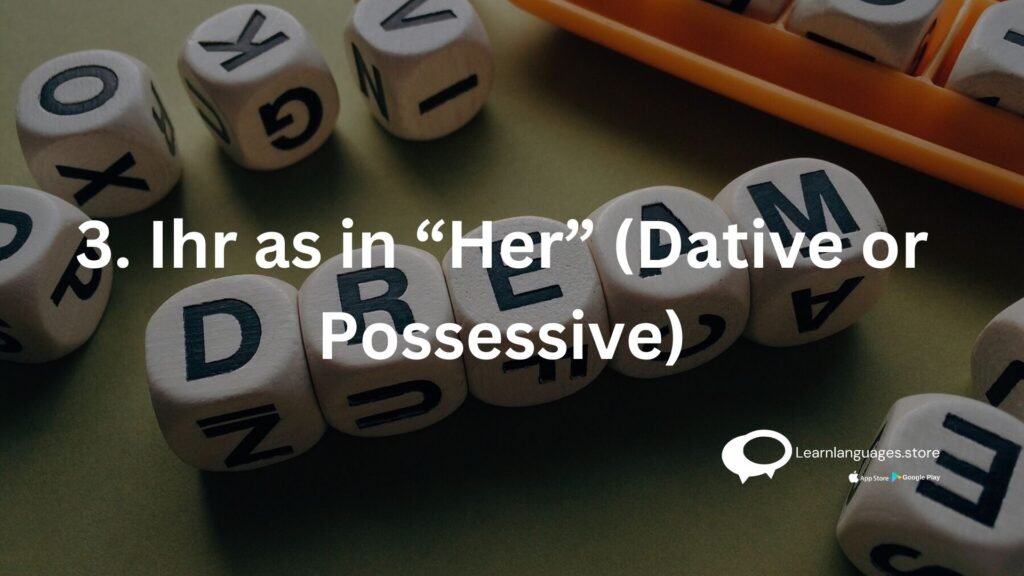An informative guide to mastering the forms of ‘Ihr’ in German
An informative guide to mastering the forms of ‘Ihr’ in German
German language learners enjoy learning homonyms, particularly the word ‘ihr’, which can be used in various forms and in everyday conversations.
Estimated reading time: 6 minutes
Fortunately, interpreting the meaning of ihr isn’t as difficult as it appears at first. Usually, you can deduce what someone is saying from the context. In this guide, we will explain all of the different meanings and forms of the word ihr in German and provide you with the guidelines you need to find the correct definition.
Except in the accusative case, the masculine and neuter forms have the same endings. Except for the dative case, the feminine and plural endings are the same. Recognizing these similarities can help you remember the forms much more quickly and easily.
If you want to become a fluent German speaker, it is significant for you to learn German grammar. Grammar is considered to be a primary pillar of any language. Mastering grammar may take time but it is always a worthwhile learning experience for every language learner. If you know German grammar, look for ways to improve it.
1. Ihr as in “Your” (Possessive, Formal)
Let’s begin with the most basic form to identify, Ihr in the second-person possessive formal. Because it begins with a capital “I,” you can immediately understand what this Ihr means in written form.
When you see Ihr with the capital “I,” it is a possessive pronoun, also known as “your” in formal. Depending on the context, Ihr can be singular or plural in this case.

Du and dein (you and your) are informal ways of addressing someone. Friends, family, and people of similar ages frequently use du. When addressing someone formally, use Sie and Ihr (your and yours). Use this form with your boss, employees, and anyone much older than you.
For example: Ihr Kalender ist voll. (Your calendar is full)
You must assign the correct ending to Ihr based on the gender, case, and number of the following nouns.
For example: Ich habe Ihre Dokumente. (I have your documents)
The feminine nouns Dokumente and Aufmerksamkeit call for an -e ending for the possessive formal pronoun Ihr.
For example: Geben Sie mir Ihren Schlüssel. (Give me your key)
2. Ihr as in “Their” (Possessive, Plural)
The third-person plural possessive pronoun meaning “their” is the easiest form of ihr to identify. When speaking in the possessive about a group of people, use ihr with a lowercase “i.” This is a plural form of ihr that allows you to refer to multiple people.

The capitalization in written German indicates whether “your” or “their” is intended. However, in spoken German, you must rely on the context of the conversation. Let’s look at some ihr example that means “their.”
For example: Ihr Hotel ist in der Nähe. (Their hotel is closed)
We don’t need an ending for ihr before a neuter noun in the singular nominative case. Please keep in mind that this sentence could also mean “Your hotel is close.” Understanding who is being spoken to is the only way to differentiate.
Example: Ich habe ihre Tickets. (I have their tickets)
In this example, tickets are plural and in the accusative case, so it has an -e ending.
Example: Wir können ihren Rucksack nicht finden. (We can’t find their backpack.)
3. Ihr as in “Her” (Dative or Possessive)
Ihr can also be translated as “her” in the third-person possessive or dative singular. Sie can be translated as “she” and ihr as “her.” However, keep in mind that these forms are used differently in German than in English. You will need the dative form of sie, which is ihr, when using “her” as the indirect object in a sentence.

For example: Ich gab ihr ein frühes Geburtstagsgeschenk. (I gave her an early birthday present)
In this example, ich is the nominative subject, Geburtstagsgeschenk is the accusative direct object, and ihr is the dative indirect object.
You can also use ihr to indicate that something belongs to “her.” Remember to use the correct ending depending on the case, gender, and number of the preceding noun.
For example: Ihr Lied war inspirierend. (Her song was inspirational)
Certain prepositions, such as mit (with), aus (from), bei (at), außer (except), nach (after), seit (since), von (from), and zu (to), always require a dative pronoun.
For example: Wir arbeiten mit ihrem Mann. (We work with her husband)
For example: Er ging zu ihrer Wohnung. (He went to her apartment)
4. Ihr as in “You Guys” (Informal)
Ihr is also the informal second-person plural form for “you guys.” Remember that there are several ways to say “you” in German, depending on the formality of the situation.
Ihr is one of the informal pronouns you use when speaking to a group of friends, children, family members, or people you care about. Sie is usually more appropriate if you don’t know someone personally.

In addition to formal and informal, you must distinguish between plural and singular in German. Sie, the singular and plural forms of the formal pronoun for “you,” is the same. The plural form of “you” is ihr, and the informal singular form is du.
For example:
– Habt ihr den neuen Film gesehen? (Did you guys see the new movie?)
– Ihr habt das Beste verpasst. (You guys missed the best part)
Conclusion
You now know how to say “you,” “their,” “her,” and “you guys” in German with ihr. Studying cases, genders, and pronouns will assist you in understanding the meanings of ihr and determining who is speaking to whom.
Learn Languages Store
Vashi,
Email: services@learnlanguages.store










